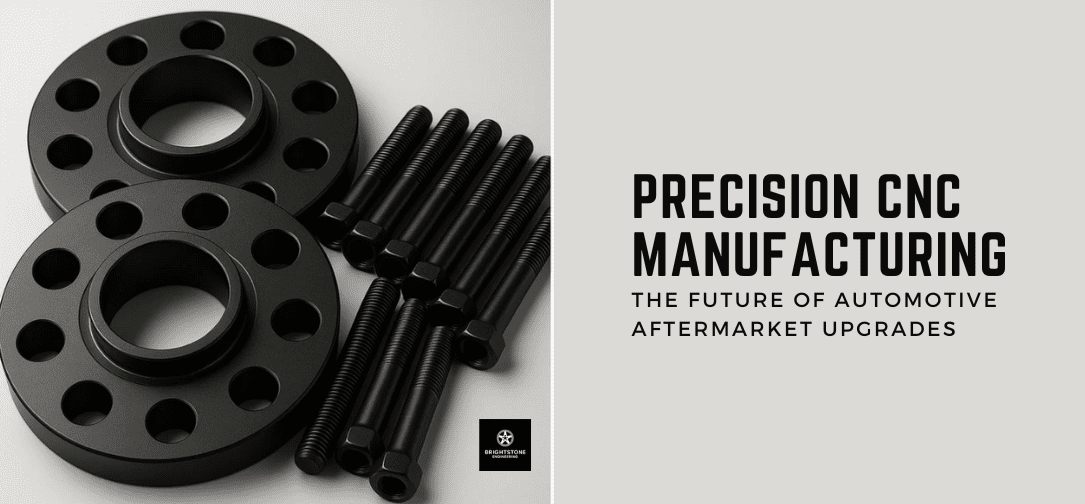In today’s automotive industry, technology and innovation are not only shaping factory production but also transforming the aftermarket sector. From custom exhaust systems to suspension kits, precision engineering is enabling enthusiasts and professionals alike to push the limits of performance, safety, and style. Among the most popular upgrades are wheel spacers, a component that highlights how modern CNC machining can deliver high-quality, safe, and cost-effective solutions for car owners worldwide.
Why Precision Matters in Automotive Upgrades
Automotive components must withstand enormous forces. Whether it’s the stress of high-speed driving, the repeated impact of potholes, or the exact alignment required for drivetrain stability, the margin for error is slim. This is where precision CNC machining has proven indispensable.
CNC (Computer Numerical Control) machining allows for tolerances measured in fractions of a millimeter. For components like hub-centric wheel spacers, which are designed to fit perfectly between a wheel and hub, that level of accuracy is critical. Poorly manufactured spacers risk vibration, uneven wear, or even safety hazards. Precision-machined spacers, however, ensure a secure fit, correct load distribution, and long-term reliability.
The Role of Wheel Spacers in Modern Vehicles
Wheel spacers are far more than cosmetic accessories. By creating extra clearance between the hub and the wheel, they can:
- Improve handling by widening the track width.
- Allow fitment of aftermarket wheels or brake kits.
- Enhance vehicle stance for a sportier, more aggressive look.
- Correct offset mismatches that occur when mixing OEM and aftermarket parts.
These benefits make spacers a common choice for enthusiasts modifying performance cars like BMWs, Audis, or Volkswagens. However, the safety and performance gains depend entirely on the quality of the manufacturing process. That’s why sourcing from a trusted UK wheel spacer supplier is increasingly valued by both shops and end users.
Local Manufacturing vs. Mass Imports
For years, the wheel spacer market has been dominated by imported products. While low cost is attractive, it often comes with trade-offs in material quality, consistency, and delivery times.
Local manufacturers using CNC technology provide several advantages:
- Material assurance: Premium aluminum alloys such as 6061-T6 or 6082 are used consistently.
- Reduced lead times: Instead of waiting 60–90 days for overseas shipments, UK machining shops can deliver within days or weeks.
- Quality control: Immediate feedback loops and batch inspections ensure defects are minimized.
- Brand trust: “Made in the UK” is a selling point for performance enthusiasts who prioritize safety.
Brightstone Engineering, for example, produces hub-centric wheel spacers using 4-axis CNC milling. Every spacer is checked for dimensional accuracy, anodized for corrosion resistance, and packaged with high-tensile hardware to match OEM standards.
Technology Driving the Aftermarket
The broader trend here is that precision manufacturing is leveling the playing field between small-batch producers and global suppliers. Advanced CNC mills, CAD/CAM design software, and even 3D scanning now allow independent shops to replicate and improve upon OEM designs at competitive costs.
For customers, this means:
- More choice in aftermarket upgrades.
- Confidence that parts meet technical requirements.
- Access to niche or custom solutions that mass manufacturers may not offer.
Take, for example, a BMW owner seeking a perfect stance adjustment. Instead of compromising with a generic spacer set, they can order BMW-fitment wheel spacers engineered to exact specifications. This fusion of personalization and precision is reshaping expectations in the aftermarket sector.
Safety and Regulation
One concern often raised with aftermarket parts is safety. Critics sometimes claim that wheel spacers compromise integrity. However, when produced using aerospace-grade aluminum and machined to exact tolerances, spacers are as safe as OEM components.
In fact, safety improves when the spacer is hub-centric — meaning it transfers loads directly through the hub lip rather than relying solely on wheel bolts. Properly engineered spacers don’t just widen the stance; they maintain factory-level safety margins.
This is why education matters. Informing enthusiasts about the differences between cheap cast spacers and precision-machined versions can prevent accidents while also promoting responsible modification culture.
The Future of Automotive Precision Parts
As the automotive world moves toward electrification, the demand for precision components will only increase. EVs, for example, require tighter tolerances due to higher torque delivery and heavier curb weights. Aftermarket upgrades like spacers, suspension kits, and adapter plates must evolve alongside these demands.
Local CNC shops are well positioned to meet this challenge. Their ability to prototype, iterate, and deliver small batches quickly makes them more agile than overseas mass producers. And for car owners, that agility translates into more options, faster upgrades, and continued innovation.
Final Thoughts
Precision CNC machining is no longer just for aerospace or medical industries — it’s now a cornerstone of the automotive aftermarket. By combining advanced technology with local expertise, manufacturers can deliver components like wheel spacers that balance safety, performance, and style.
As enthusiasts continue to demand more from their vehicles, companies like Brightstone Engineering are proving that local, high-precision manufacturing isn’t just competitive — it’s essential to the future of automotive innovation.

































